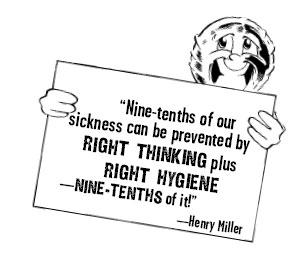When All Hell Breaks Loose (65 page)
Read When All Hell Breaks Loose Online
Authors: Cody Lundin

Staying as clean as possible after a disaster will help prevent the spread of disease, increase morale, and reduce stress by offering a predictable routine.
Water-saving baths and showers can be improvised using hot-water-soaked towels and large and small spray bottles filled with warm water (sun-warmed or otherwise).
Toothbrushes can be improvised with rags and certain plants. Toothpaste can be improvised from baking soda or salt.
Alcohol-based, waterless hand sanitizers can be used externally to spot disinfect smelly body parts, as can other common bathroom products such as baby towelettes. Pure rubbing alcohol dries out the skin and should be used with caution.
Ultraviolet radiation from strong sunlight can be used to clean dirty clothing, blankets, or sleeping bags.
Although it will be emotionally and mentally challenging, you may be forced to deal with the dead body of a loved one or a stranger after a disaster.
If authorities are unable to recover the dead body in a timely manner, document in writing everything you can about the scene including the individual's name, age, sex, time and cause of death, position found, and any other details you feel will help the authorities piece together what happened.

Important!
Dead bodies in themselves normally
do not
create a serious health hazard unless they died of a contagious disease such as plague or typhus. (In these cases, the disease is carried and spread by fleas, lice, rats, and mice in contact with the body.) Bodies suspected of having tuberculosis should have a piece of cloth put over their mouths and be handled in open areas with good ventilation. Dead bodies can pollute water sources due to leaking feces.
The misconception that dead bodies spread disease takes valuable resources away from survivors. Fulfill the needs of survivors first and then deal with the bodies.
The two main factors that cause a dead body to putrefy are heat and the amount of bacteria already present within the intestines. The second factor is the unknown variable for how quickly a body will begin to decompose. All dead bodies will become greatly disfigured when they decompose.
Caution! When disposing of a dead body, ensure universal precaution against blood and body fluids at all times!
Wear protective clothing and wash and disinfect hands, clothing, and all equipment after the fact. Body bags can be improvised from barrel liners or sheet plastic and duct tape.
Graves should be dug according to the size of the body, at least one hundred feet away from all surface water sources and at least five feet above the water table. Reread the sanitation chapter if necessary. Upon burying the body, make sure it's covered with at least three feet of earth, mound it up, and tamp it down.
If accidentally exposed to blood or body fluids in your eyes, mouth, mucous membranes, or into a penetrating injury or cut, wash the area profusely with disinfected water, use liberal amounts of topical disinfectants, lightly cover the area with a sterile, breathable bandage, and seek medical help for further treatment if available.
Create a ritual or "closing ceremony" to aid in the healing process of the living.
Have hygiene supplies on hand such as baby powder, fingernail clippers, sanitary napkins and/or tampons, toothbrushes and dental floss, insect repellent, toilet paper, towels, soap, disposable diapers, waterless hand sanitizer, and liquid chlorine bleach.
